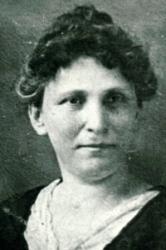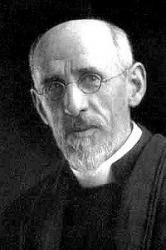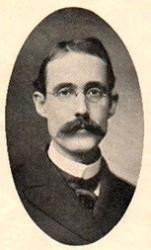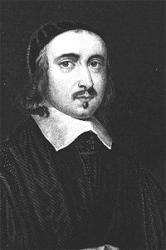Planning worship?
Check out our sister site, ZeteoSearch.org,
for 20+ additional resources related to your search.
- |
User Links
Person Results
Laura S. Copenhaver

1868 - 1940 Author of "Heralds of Christ, who bear the King's commands" in The Hymnal of the Evangelical Mission Covenant Church of America Born: August 29, 1868, Marion, Virginia.
Died: December 18, 1940, Marion, Virginia.
Buried: Round Hill Cemetery, Marion, Virginia.
Copenhaver was a professor of English Literature at Marion College, which her father John Jacob founded and where her sister May was dean of women. She wrote a number of hymns and magazine articles, and served as chairman of the education committee of the Woman’s Missionary Society of the United Lutheran Church.
--www.hymntime.com/tch
Laura S. Copenhaver
William Whittingham
1524 - 1579 Person Name: W. W. Author of "Nisi quia Dom" in The Whole Booke of Psalmes
William Whittingham
Dale Grotenhuis
1931 - 2012 Harmonizer of "GENEVAN 124" in Psalter Hymnal (Gray) Dale Grotenhuis (b. Cedar Grove, WI, 1931; d. Jenison, Mi, August 17, 2012) was a member of the 1987 Psalter Hymnal 1987 Revision Committee, and was professor of music and director of choral music at Dordt College, Sioux Center, Iowa, from 1960 until he retired in 1994 to concentrate on composition. Educated at Calvin College; Michigan State University, Lansing; and Ohio State University, Columbus; he combined teaching with composition throughout his career and was a widely published composer of choral music. He also directed the Dordt choir in a large number of recordings, including many psalm arrangements found in the 1959 edition of the Psalter Hymnal.
Before coming to Dordt, Grotenhuis taught music at Christian high schools in Washington and Michigan. Under his direction, the Dordt College concert choir participated in annual tours that took members throughout the United States, Canada and Europe. He loved the church and the music of the church. His favorite song was "All Glory Be to God on High".
Bert Polman (last two sentences from Joy Grotenhuis, daughter-in-law)
Dale Grotenhuis
T. A. Lacey

1853 - 1931 Person Name: Thomas Lacey Author of "The Dying Robber Raised His Aching Brow" in The Cyber Hymnal Lacey, Thomas Alexander, s. of G. F. Lacey, was b. at Nottingham, Dec. 20, 1853. He entered Balliol Coll., Oxford, as an exhibitioner in 1871 (B.A. 1876, M.A. 1885), was ordained D. 1876, P. 1879, was from 1894 to 1903 Vicar of Madingley near Cambridge, and since then has been Chaplain of the London Diocesan Penitentiary. He was one of the Committee who compiled The English Hymnal, 1906, and contributed to it twelve translations (8, 66, 67, 69, 104, 123, 124, 174, 208, 226, 249, 325), also one unpublished and one previously published original, viz.,
1. O Faith of England, taught of old. [Church Defence.]
2. The dying robber raised his aching brow. [Good Friday.] First in the Treasury, Sept. 1905, p. 482, headed "Sursum."
Three other translations by him are noted at pp. 989, i. 1139, ii. [Rev. James Mearns, M.A.]
--John Julian, Dictionary of Hymnology, New Supplement (1907)
T. A. Lacey
Martin Tel
Author of "Our Help Is in the Name of God the LORD" in Psalms for All Seasons Martin Tel is the C. F. Seabrook Director of Music at Princeton Theological Seminary in Princeton, New Jersey. He conducts the seminary choirs, teaches courses in church music, and administers the music for the daily seminary worship services. He served as senior editor of Psalms for All Seasons: A Complete Psalter for Worship (2012). His love for music began in a dairy barn in rural Washington State, where he heard his father belt out psalms and hymns while milking the cows. Martin earned degrees in church music and theology from Dordt College, the University of Notre Dame, Calvin Theological Seminary, and the University of Kansas. He has served as minister of music in Christian Reformed, Reformed Church in America, and Presbyterian congregations. With his wife, Sharilyn, he is raising three children in Princeton, New Jersey.
Lift Up Your Hearts
Martin Tel
Marion Franklin Ham

1867 - 1956 Author of "O Lord of life" in The Beacon Song and Service book Born: February 18, 1867, Harveysburg, Ohio.
Died: July 23, 1956, Arlington, Massachusetts.
Buried: Mount Auburn Cemetery, Cambridge, Massachusetts.
Ham began his career as a journalist and bank clerk in Chattanooga, Tennessee. Ordained a Unitarian minister in 1898, he pastored in Chattanooga (1898-1904); at the First Church in Dallas, Texas (1904-09); and in Reading (1909-34), Waverly (1934-42), and Gardner, Massachusetts (1943-45). The Meadville Theological School in Chicago, Illinois, awarded him a Doctor of Divinity degree in 1942, the year he retired. Ham’s works include:
The Golden Shuttle, 1896
The Kinchin Stories, 1914
Songs of the Spirit, 1932
Songs of Faith and Hope, 1940
O Mother-Heart, 1941
Keeper of the Flame, 1945
Freedom, 1950
Songs at Sunset, 1951
Songs of a Lifetime, 1953
In a Rose Garden, 1954
www.hymntime.com/tch/
Marion Franklin Ham
Jeremy Taylor

1613 - 1667 Author of "Descend to thy Jerusalem, O Lord!" in Services for Congregational Worship. The New Hymn and Tune Book Taylor, Jeremy, D.D. This poet of preachers was born of very humble parentage on both sides, at Cambridge, in August, 1613. His father was a barber. He must have had a good school as a boy. He entered Cams College, of his native city, as a "sizar" in 1626. His career at the university was a brilliant one. He was made fellow of All Souls College, Oxford, in 1632; and rector of Uppingham, Rutlandshire, in 1638, as is still proudly remembered there. He was inevitably "sequestered" by Parliament in 1642. Inexorable necessities of circumstance put him in prison. During the opening of the great Protectorate he kept a school in Wales along with William Nicholson, and acted as chaplain to the Earl of Carberry at Golden Grove, Carmarthenshire, one of the pilgrim spots of our country, because of this and of his imperishable book named after it. In 1658 he is found in Ireland. He preached at Lisburn and Portmore. He returned to London early in 1660, and signed the loyalist or royalist Declaration of the Nobility and Gentry, on April 24th, thirty-five days before the "Restoration." He was not overlooked, as so many faithful royalists were. He was consecrated bishop of Down and Connor in January, 1661; made a member of the Irish Privy Council in February; entrusted with the diocese of Dromore in March: and in the same year was chosen Vice-chancellor of the University of Dublin. He died at Lisburn, August 13th, 1667, and was interred in the choir of the cathedral of Dromore.
Bishop Taylor's complete works have been repeatedly edited, e.g. by Henry Rogers, Pitman, Bishop Heber, Eden; and manifold Selections and single books, as his Holy Living and Holy Dying. Notwithstanding his rich and im¬perial intellect, and enthralling eloquence, and absolute command of words, Bishop Taylor holds only a very small place in the Antiphon of England. It has been admirably said by Dr. Rowland Williams, "Poetry differs from eloquence, as love differs from friendship" (Stray Thoughts, 1878). His attempts at verse are eloquence, not poetry, and even the eloquence hampered and shallowed. The present writer collected his entire poems and verse-translations in the Miscellanies of the Fuller Worthies' Library (1870). In the "Introduction" the reader will find a critical ac¬count of the various hymns; and also therein an account is furnished of a flagrant misap¬propriation of Bishop Taylor's Hymns by Samuel Speed in his Prison Piety, or Meditations divine and moral. Digested into poetical heads on mixt and various subjects (1677). The following is the original title page of the volume in which all the Festival Hymns, save one, first appeared:—>
The Golden Grove, or a Manuall of Daily Prayers and Letanies Fitted to the dayes of the Week. Containing a short Summary of what is to be Believed, Practised, Denied. Also Festival Hymns According to the manner of "The Ancient Church." Composed for the Use of the Devout, especially of Younger Persons; By the Author of "The Great Exemplar." London: Printed by J. F. for R. Rayston, at the Angel in Ivie Lane, 1655. (12 mo.) A 2nd edition appeared in 1657 with the Author's name thusBy Jer. Taylor, D.D., Chaplain in Ordinary to his late Majesty—a courageous announcement in the circumstances. A 3rd edition seems to have disappeared. The 4th ed. appeared in 1659; and from it is derived the second Christmas Hymn, “Awake, my soul," which was not in either the 1st or 2nd ed. Heber, Pitman, and Eden overlooked this hymn. [Rev. A. B. Grosart, D.D., LL.D.]
From Bishop Taylor's Golden Grove, 1655, the following hymns are in common use:--
1. Full of mercy, full of love. Prayer for Charity. From the Golden Grove, p. 116, where it is given in 20 lines, and headed, "A Prayer for Charity." It was given in Bishop Heber's posthumousHymns, &c, 1827, p. 109, and thus came into later hymnbooks.
2. Lord, come away, why dost Thou stay. Advent.
3. Lord, let Thy flames of holy charity. Whitsunday. This begins with line 12 of his hymn in the Golden Grove, "On the Feast of Pentecost, or Whitsunday," p. 157.
His Christmas Carol, "Where is this blessed Babe” and his Prayer, "My soul doth pant towards Thee," are also from the Golden Grove.
-- John Julian, Dictionary of Hymnology (1907)
Jeremy Taylor
Thomas H. Cain
1931 - 2003 Person Name: Thomas H. Cain, b. 1931 Author of "Eternal Lord of love, behold your Church" in The Hymnal 1982
Thomas H. Cain


 My Starred Hymns
My Starred Hymns


